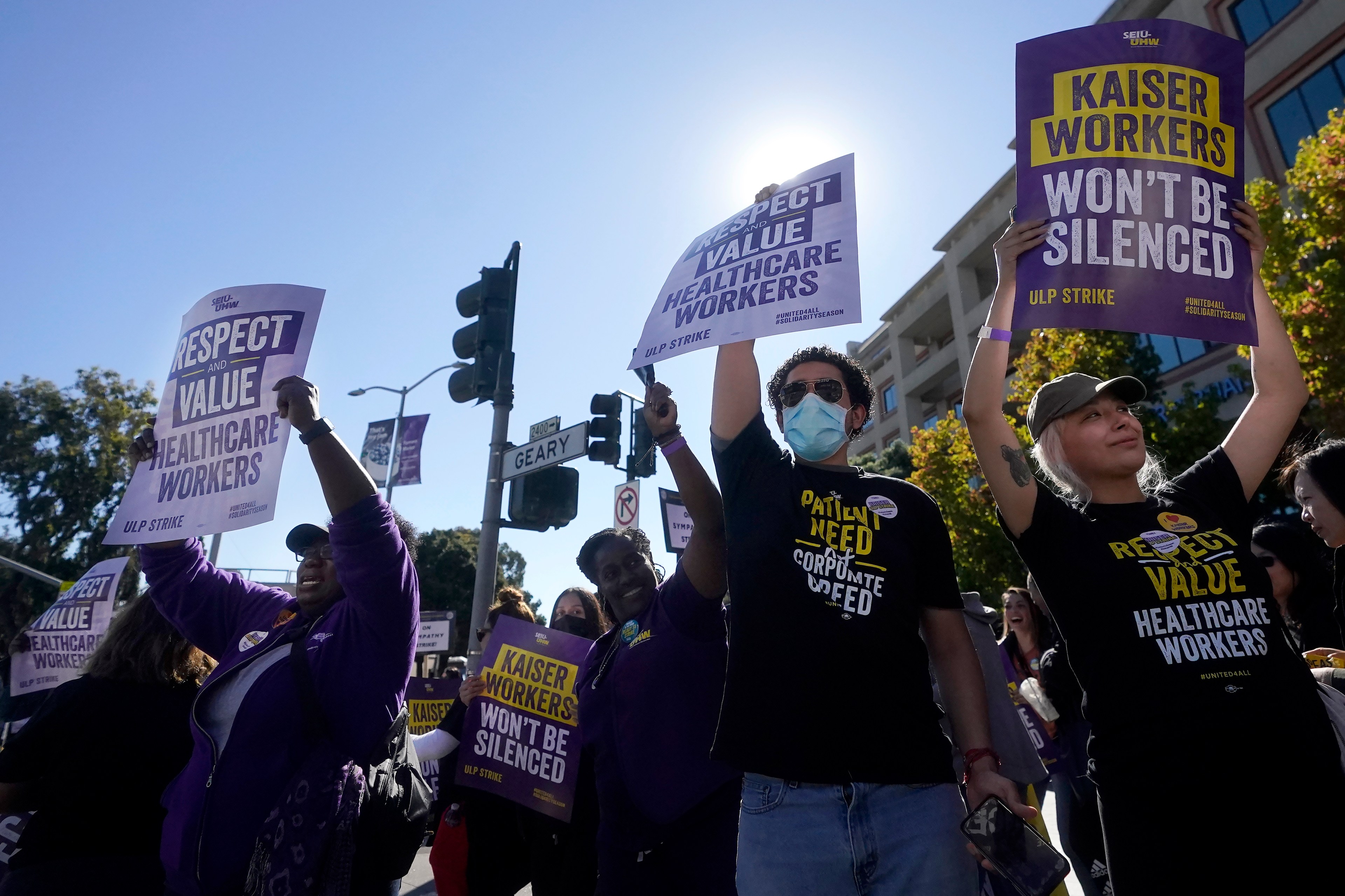The largest health care strike in U.S. history kicked off early Wednesday morning as 75,000 employees of Kaiser Permanente across California and several other states walked off the job.
Since the vast majority of Kaiser patients live in the company’s home state, the strike stands to have an outsize impact on California—and the Bay Area in particular.
Here’s what to know about the three-day walkout set to last through 6 a.m. Saturday.
What’s It About?
Post-pandemic burnout and pervasive short-staffing in the health care industry, where workers say they care for too many patients for too little pay, have galvanized unions throughout the country to demand higher wages and better working conditions.
The Kaiser strike, which comes just days after the last contract expired, culminates about six months of negotiations and grapples with many of the same issues that fueled other walkouts in the industry earlier this year: starting salaries, raises, benefits, hiring practices and workforce development.
Eight labor groups under the aegis of the Coalition of Kaiser Permanente Unions say the health care giant reported more than $24 billion in profits over the last five years, paid its CEO more than $16 million in 2021 and gave 49 other executives more than $1 million-a-year salaries.
Meanwhile, union leaders say Kaiser wants to cut performance bonuses for support staff and outsource jobs to “low-wage, for-profit companies” while letting wages lag amid soaring inflation.
Kaiser calls many of the coalition’s claims misleading, saying it offered across-the-board wage hikes and a company-wide minimum hourly pay of $21—$5 less than the union’s desired $26.
Kaiser officials also say they spent millions to train staff, accelerate hiring and fund pay bumps of 10% and 14% over four years.
In a statement over the weekend, the union coalition said both sides “remain far apart” on key issues like pay and staffing. “So far, there is no light at the end of the tunnel,” union leaders wrote.
In the days to follow, however, Kaiser executives downplayed the imminence of the walkout. “A strike is not inevitable,” hospital officials said in a statement, “and it is certainly not justified.”
Even so, thousands of temp workers were hired to fill vacancies just in case.
How Big of a Deal Is It?
Pretty big.
Some 75,000 workers are striking, and though the Oakland-founded nonprofit hospital chain serves 13 million patients nationwide, a disproportionate share live in California.
The unions striking represent about 19,000 Kaiser workers in the Bay Area alone. Meanwhile, two other unions with a combined 14,000 members who work as engineers, scientists or managers authorized a sympathy strike.
Picket lines assembled at more than a dozen Bay Area Kaiser locations, including in San Francisco, Oakland, San Leandro, South San Francisco, San Jose, Hayward, Santa Clara, San Mateo, Vallejo, Richmond, Fremont, Antioch, Santa Rosa, Walnut Creek and Redwood City.
Who’s Striking?
Here’s who’s not joining the walkout: doctors, registered nurses and managers. Emergency departments and hospitals will remain open, according to Kaiser spokespeople, as will pharmacies for inpatient care and critical infusion services.
“Our facilities will be staffed by our physicians, trained and experienced managers and staff,” hospital officials told The Standard in an email Tuesday, “and in some cases, we will augment with licensed and contract staff.”
That said, the unions leading the strike represent workers who provide critical service to patients.
They include tens of thousands of support and other staff including X-ray and lab techs, phlebotomists, workers who disinfect rooms between patients, pharmacy employees who dispense critical medications, home health aides, respiratory therapists, transporters, housekeepers, ultrasound sonographers, vocational nurses and a range of others who help with surgeries, run imaging technology and work in outpatient clinics.
How Will It Affect Patients?
Though a strike as massive as this one will no doubt be significantly disruptive, studies have shown that walkouts are unlikely to harm patients.
The three-day work stoppage at Kaiser will spur a flurry of rescheduling, company officials said—but only for non-urgent appointments and procedures and only “as long as that is appropriate and safe for the patient.”
“We will contact any patient affected by the strike in advance, if necessary, and work with them to reschedule their appointments,” Kaiser officials told The Standard. “There is no need for patients to call or email their doctor’s office at this time.”
Kaiser said some outpatient pharmacies will close or reduce hours to accommodate the labor action. If possible, patients should use Kaiser’s mail-order delivery option to refill medications in three to five days with no shipping fee.
Lab, radiology and optical locations may also temporarily shutter for the duration of a strike, per the hospital. For urgent needs at any of those sites, members can call 866-454-8855. Though that call center may be inundated with longer-than-usual wait times, hospital spokespeople say it will be staffed around the clock.
In addition to reaching out to individual patients as needed, the hospital is directing members to look for the latest updates at kp.org.
Will It Delay Covid Booster and Flu Shots?
Rolling out Covid boosters this year has already been slow-going, and the strike certainly won’t help.
In addition to Kaiser only receiving its supply of Covid vaccines a couple of weeks ago, union members say chronic understaffing at the hospital chain has compounded delays for people trying to get inoculated before cold season sets in.
According to media reports, other pharmacies are preparing to take on patients who may be unable to get their vaccines through Kaiser.
The nonprofit health giant says it still plans to offer the shots on a walk-in basis at some locations during the strike—it just might take longer to get one.
